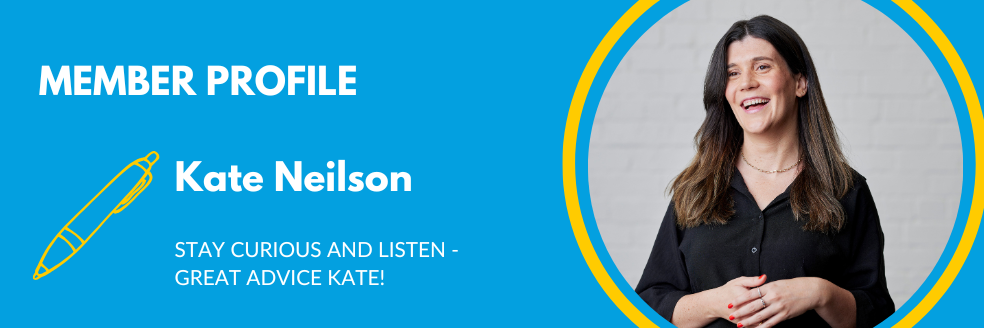Member Spotlight - Kate Neilson
We chatted to Kate Neilson
Kate Neilson is a content creator with over a decade of experience producing content for a range of diverse clients from all walks of life. She is a senior editor at Mahlab, a global business communications agency headquartered in Sydney, Australia, where she works on a range of different clients, including leading the publications and podcast of the Australian HR Institute.
Tell us about your journey in communications – how did this path come about?
Like many people at 18, I had no idea what I wanted to do with the rest of my life. So I started where most people do – by looking at what I enjoyed doing at school. For me, that was English and drama.
I knew I wasn’t going to be the next Cate Blanchett, so communications felt like a natural fit. I went on to study journalism at Charles Sturt University in Bathurst, and moving to the country ended up being one of the best decisions I’ve made. The course was hands-on and practical – we ran a radio station that broadcast across central west NSW, interviewed real people and learned from journalists who’d been on the frontlines of major events.
That experience sparked a lifelong preference for learning by doing. I’m not someone who reads the manual – I build it and figure it out as I go. Sometimes that works brilliantly. Sometimes... not so much.
Over the years, I dabbled in a few sectors – government, finance – before landing at Mahlab, where I’ve been lucky to work across a huge range of clients and industries.
I found my niche in the HR and business space, particularly through my work as senior editor for the Australian HR Institute’s publications. Seven years later, I’m still hooked. There’s always a new angle to explore or a fresh challenge to help a client tackle. Communications is never boring.
What aspect of communication do you most enjoy, and why?
I love the problem-solving side of communications – taking a complex business issue and finding the best way to move people towards clarity, action or understanding.
It’s not about making things sound good for the sake of it. It’s about impact – helping clients see tangible outcomes from a campaign or piece of content and showing them how comms can influence behaviour, build culture or support big-picture strategy.
What are your top three tips for communication professionals?
My tips all centre around one key skill: curiosity. It’s the most underrated tool in a communicator’s toolkit.
Interested is interesting.
If you’re genuinely curious about people, ideas or business challenges, that comes through in your work.
You’ve got two ears and one mouth for a reason.
Listen carefully – especially to what’s not being said.
Ask smart questions.
Don’t worry about sounding clever. Worry about getting to the heart of the issue. A well-timed “Why’s that?” or “Can you say more about that?” can be far more powerful than a polished paragraph.
How does IABC NSW membership help support you in your career?
I only recently joined, but I’ve already felt the benefits. It’s a vibrant, supportive and generous community – everyone genuinely wants to share ideas and elevate each other’s work, which I love. You don’t get that in every industry!
I had the chance to speak at the IABC Fusion conference in Manila earlier this year, which was a huge privilege. I met incredibly smart, passionate people and came away buzzing with ideas and connections I wouldn’t have found otherwise. It reminded me how energising it can be to step out of your usual work bubble and into a community of like-minded peers.
If you could add a superpower to your team, what would it be, and why?
Time travel! There are often things I’d would want to do differently with hindsight on my side (I’m sure that’s true of most people), and I would love to be able to get to the heart of an issue faster by knowing exactly what challenges we might face along the way.
But that’s the beauty of not having superpower, I guess. You get to learn from your mistakes and build strong relationships with your stakeholders along the way.
What advice would you give a comms professional just starting out?
Say yes to as many experiences as you can. The early years of your career are about exposure – to different industries, voices, challenges and ways of working. It’s how you build perspective and confidence.
Also, pay attention to the people you admire. Learn from them. Study how they think, how they write, how they lead a room. And don’t be afraid to ask them questions – most people are happy to share what they’ve learned if you show genuine interest.
And finally – see question three. Curiosity really is your superpower.

